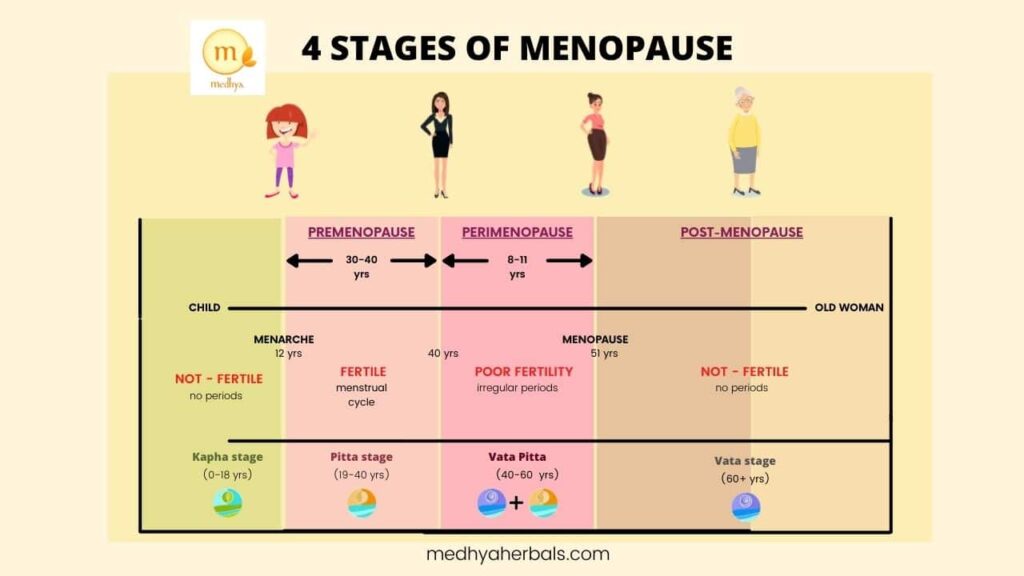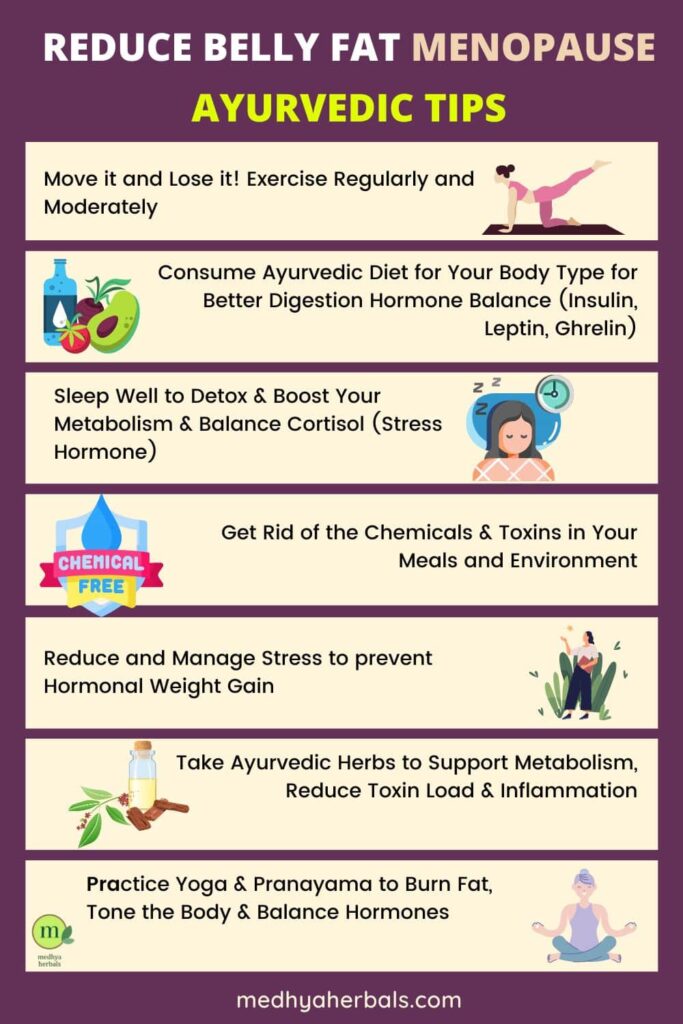Menopause – a phase every woman experiences in her lifetime, often accompanied by a host of transformative changes. One change that can be particularly challenging for many is menopause weight gain. Weight gain during menopause is not only a common phenomenon but also one that frequently leads to questions like: ‘Why does menopause cause weight gain?’ or ‘How to stop menopause weight gain?’ We understand the concern and confusion that this topic often brings about, and that’s why we are dedicating this in-depth piece to address it.
In this article, we will dissect the causes behind weight gain in menopause, debunk some common misconceptions, and most importantly, share strategic advice on managing this challenging symptom. From understanding the impact of hormones on your body, exploring the importance of diet and exercise, to shedding light on the role of natural remedies and vitamins for menopause weight gain – we’ve got you covered.
Rest assured, by the end of this piece, you will have an enhanced understanding of menopause weight gain and be better equipped to handle the changes it may bring. Let’s navigate this journey of self-discovery and self-care together, creating a healthier and happier you. Let the journey to a well-informed and empowered you begin!
Understanding Menopause and its Phases
Menopause, an integral part of the female lifecycle, signals the cessation of a woman’s fertility period. This biological process is primarily categorized into three stages:

Perimenopause
Typically, this stage begins several years before menopause when the ovaries gradually start producing less estrogen. As the first stage of menopause, perimenopause often results in weight gain due to these hormonal shifts.
Menopause
Menopause is the stage confirmed when a woman has gone through a complete year without a menstrual cycle. At this point, the ovaries produce considerably less estrogen and cease progesterone production, leading to weight gain during menopause.
Postmenopause
The years following menopause are referred to as the postmenopause phase. Although symptoms like hot flashes usually diminish during this stage, the health risks associated with estrogen depletion, such as heart disease and osteoporosis, heighten.

What Triggers Menopausal Weight Gain?
Weight gain is a rapid increase in weight (usually more than 3 Kg) of a person. It may be due to an accumulation of excess calories or living a sedentary lifestyle, or even a metabolic problem.
The basic point of it is, fat gets deposited in the body, leading to an increase in weight.
Now, this cycle of weight gain can happen in anybody. But, why does menopause predisposes you to weight gain and what should you do about it?
Let’s check out the specific triggers of menopausal weight gain.

Hormonal Fluctuations
Your estrogen and progesterone levels significantly fluctuate during perimenopause before declining dramatically. These hormonal imbalances are often linked with increased appetite, reduced metabolic rates, and weight gain. Here’s how:
Estrogen
Estrogen levels often become high relative to Progesterone in the body. This causes typical symptoms of Estrogen dominance during perimenopause. High estrogen further disturbs other hormones in the body. Also, high estrogen affects your fat metabolism. It makes you gain fat around your belly and slows down your metabolism by affecting your thyroid hormone.
Ghrelin
It is higher in perimenopause. This is the hunger hormone. With high levels of ghrelin, you always feel hungry and want to eat. Eventually, overeating causes overweight.
Leptin
The satiety hormone, is affected by high estrogen levels. As a result, you don’t feel satisfied even after eating enough. So, you eat more and more and the cycle continues.
Aging and Metabolic Shifts
As we grow older, our metabolic rates tend to slow down, leading to fewer calories burnt while resting. Without appropriate adjustments to caloric intake, this can result in weight gain.
Aging also results in a decrease in muscle mass and an increase in fat mass. As muscles burn more calories than fat, this shift in body composition can contribute to weight gain.
Lifestyle Factors
A sedentary lifestyle, poor diet, and lack of regular exercise can lead to rapid weight gain during menopause. Furthermore, stress and inadequate sleep significantly impact hormones that regulate weight, often culminating in weight gain.
Women have been seen to gain 2.2 kg plus or minus 4.41 kg in perimenopause. That’s a wide range, because, again, it depends on nature and nurture.
By understanding the root causes of menopause weight gain, you can proactively take steps to counter these changes and maintain a healthy weight throughout this transformative phase of your life. The following sections will provide a detailed exploration of effective strategies to manage weight gain during menopause.
Excess Weight at Menopause
Excess weight gain at Menopause really indicates metabolism that is too slow. And also, it is a sign of underlying hormone imbalances, which triggered menopausal weight gain in the first place.
So, weight gain is really a symptom.
What often goes unnoticed by many menopausal women is the peripheral health complications of menopausal weight gain.
Health issues of Excess Menopausal Weight Gain
Poor metabolism and hormone imbalances, when not controlled in time can lead to high cholesterol levels and (silent) heart problems for many women in the age group 45 years plus.
- Edema
- Kidney problems
- Adrenal fatigue, depression and excess stress
- Liver problems
- Dry and flaky skin
- Respiratory problems
- Increased risk of colon and endometrial cancers
- Weak bones and Osteoporosis

Strategies to Manage Weight Gain during Menopause
As we age, changes in our metabolic rate and body composition can lead to our bodies holding onto weight. These changes include slower metabolism, less muscle mass, and more fat storage.
However, menopause weight gain is not an inevitable occurrence. By understanding the mechanisms behind it and implementing effective strategies, you can navigate this life transition without unwanted weight gain. Let’s dive into how you can accomplish this:
How to Get Rid of Weight Gain During Menopause
Addressing weight gain during menopause begins with a comprehensive approach that targets dietary habits, exercise, sleep, and stress management.
- Adopt a Balanced Diet: Opt for nutrient-dense foods like fruits, vegetables, lean proteins, and whole grains, while reducing intake of processed foods, sugars, and unhealthy fats. These choices help control blood sugar levels, keeping hunger in check, and promoting weight management.
- Regular Exercise: Physical activity not only helps in burning calories but also increases metabolic rate and builds muscle mass. Incorporate both cardio activities like walking or cycling, and strength training into your routine.
- Stress Management: Chronic stress can lead to overeating and weight gain. Find effective ways to manage stress, such as yoga, meditation, deep breathing, or any relaxing hobby.
- Adequate Sleep: Lack of sleep can lead to hormonal imbalances that trigger weight gain. Ensure you get 7-9 hours of quality sleep each night.
Ayurvedic Natural Ways to Speed Up Metabolism
- Boost Your Metabolism: Exercise, particularly strength training, can boost your metabolism by building muscle mass. Also, ensure to eat regular, balanced meals to maintain a healthy metabolism.
- Limiting Sedentary Behavior: Incorporate more movement into your daily routine. Stand up and move around every hour or so if you have a sedentary job, take the stairs instead of the elevator, park further away from your destination to walk more, etc.
- Stay Hydrated: Drinking enough water can temporarily boost your metabolism and help you feel fuller, reducing calorie intake.
- Eat Regular, Balanced Meals: Skipping meals can slow down metabolism. Regular meals packed with protein, fiber, and healthy fats can keep your metabolic rate steady.
Ayurvedic Herbal Supplements for Boosting Metabolism
Ayurveda, a 5,000-year-old system of natural healing, has provided us with a wealth of herbs known for their medicinal properties and ability to boost metabolism. Here are some Ayurvedic supplements that can enhance your metabolic rate and support overall well-being:
- Amalaki (Indian Gooseberry): Amalaki is rich in antioxidants, including Vitamin C, which can enhance metabolism and promote the elimination of toxins. It also supports healthy digestion, which is crucial for maintaining an optimal metabolic rate. Medhya Herbals offers an Amalaki supplement that’s easy to incorporate into your daily routine.
- Guggul: Known for its potent purifying and rejuvenating powers, Guggul has been used in Ayurvedic medicine to treat obesity and other disorders linked to slow metabolism. It promotes detoxification, which can support a healthy metabolic rate.
- Trikatu: Trikatu, a blend of black pepper, long pepper, and ginger, is known for its ability to stimulate digestion and enhance the absorption and assimilation of nutrients, thereby boosting metabolism.
- Brahmi (Bacopa Monnieri): Brahmi is another excellent herb for overall health. It not only boosts brain health but also helps enhance metabolism and aids in weight management.
- Cinnamon: In addition to adding flavor to your dishes, cinnamon can stimulate your metabolism and help balance blood sugar levels, making it an excellent addition to your diet for weight management.
- Turmeric: The active compound in turmeric, curcumin, has been shown to boost metabolism, reduce inflammation, and even assist with weight loss. Medhya Herbals offers a Turmeric supplement that can be a helpful addition to your wellness regimen.

Combating Menopausal Weight Gain with the Right Diet
Menopausal weight gain can be frustrating, but the right dietary habits can play a critical role in managing it. Let’s delve into the ways you can leverage your diet to counteract weight gain during menopause.
Foods that Speed Up Female Metabolism
Boosting metabolism is a key component of weight management. Including the following foods in your diet can help speed up metabolism:
- Protein-Rich Foods: Foods high in protein, such as lean meats, dairy products, legumes, and eggs, can boost your metabolism for a few hours. This is due to the thermic effect of food, which is the energy required for digestion, absorption, and disposal of nutrients. Protein causes the largest rise in this thermic effect, increasing your metabolic rate by 15-30%, compared to 5-10% for carbohydrates and 0-3% for fats.
- Green Tea: Known for its multitude of health benefits, green tea can help boost your metabolic rate and promote fat burning, especially in the belly area. This is largely due to its rich content of bioactive compounds like caffeine and epigallocatechin gallate (EGCG), which have been shown to boost metabolism.
- Whole Grains: Foods such as brown rice, oatmeal, quinoa, and whole wheat bread are considered complex carbohydrates. These types of carbohydrates take longer to digest, thereby making the body work harder and burn more calories in the process compared to refined grains.
- Leafy Greens: Foods like spinach, kale, and other green vegetables are rich in dietary fiber, which requires more energy to break down and can therefore boost metabolism. They’re also packed with essential nutrients like iron, which supports healthy metabolic function by ensuring your blood can efficiently carry oxygen to your cells.
- Healthy Fats: Incorporating healthy fats into your diet can also promote a healthy metabolism. Foods rich in omega-3 fatty acids, such as fatty fish (like salmon and mackerel), flaxseeds, and chia seeds, can increase the efficiency of your metabolism. Avocados, which are high in monounsaturated fats, can also support healthy metabolic function. It’s worth noting that these foods are high in calories, so they should be consumed in moderation as part of a balanced diet.
Foods to Avoid for Menopause Belly Fat
Certain foods can exacerbate menopause belly fat. These include:
- Trans Fats: Found in processed foods, these fats can increase belly fat.
- Sugar-Sweetened Beverages: Drinks like soda are high in sugar and calories, leading to weight gain around the midsection.
- Refined Carbohydrates: White bread, pasta, and other refined carbs can cause rapid spikes in blood sugar, leading to increased fat storage in the belly.
- Alcohol: Alcohol can lead to weight gain, especially around the belly.
Exercise Regime to Counter Menopause Weight Gain
Even with a healthy diet, exercise plays an integral role in weight management during menopause. Exercise helps to offset the natural decline in metabolic rate and muscle mass that occurs with age.
Regular physical activity can help increase your metabolic rate, burn more calories, and even influence hormones that regulate appetite and satiety. Additionally, exercise can improve mood, reduce menopausal symptoms, and improve overall health.
By including an effective exercise routine, you will be able to successfully manage menopause weight gain. Let’s explore the types of exercises that can help:
Best Exercises for Menopause Belly
The ideal exercise regimen for menopause should include a blend of cardiovascular exercise, strength training, targeted abdominal exercises and flexibility workouts.
- Cardiovascular Exercise: Regular cardio activities like brisk walking, cycling, or swimming can help burn calories and improve heart health. It will help burn fat, including around your midsection. Aim for at least 150 minutes of moderate-intensity cardio each week.
- Strength Training: Strength training exercises, such as weightlifting or resistance band exercises, can build lean muscle mass, which naturally decreases with age. More muscle mass can boost your resting metabolic rate, helping you burn more calories throughout the day. Focus on total body workouts to achieve this.
- Flexibility Workouts: Exercises that improve flexibility, like yoga and Pilates, can help maintain a full range of motion and prevent injuries. Some yoga poses and Pilates exercises can also help strengthen the core and tone the body.
- Targeted Abdominal Exercises: While it’s impossible to spot-reduce fat, targeted exercises can strengthen the abdominal muscles and improve the appearance of your belly. Planks, leg lifts, and bicycle crunches are a few effective exercises.
Yoga Poses to Lose Menopausal Belly Fat
Yoga goes much deeper than just the physical movement of the body. Regular practice of suitable yoga asana help to tone the muscles thus increase strength, relax the mind to reduce stress levels and also increase bone density.
That’s why yoga is one of the best ways to naturally support your metabolism and weight loss during menopause. Here are some yoga asana that you can practice to find relief from Menopause symptoms and to lose belly fat.
- Setu Bandhasana (Bridge)
- Bhujangasana (Cobra)
- Dhanurasana (Bow)
- Ardha Matsyendrasana (Seated Half Spinal Twist)
- Natarajasana (Supine Dancing Shiva)
- Chakki Chalanasana (Churning Mill Pose)
- Janu Sirsasana (One Legged Seated Forward Bend)
- Surya Namaskara (Sun Salutations)
Conclusion
Managing menopause weight gain can indeed be a challenging endeavor. Navigating the myriad of changes that your body undergoes during this transitional phase can sometimes feel overwhelming. But remember, you’re not alone in this journey, and help is readily available.
Ayurveda, with its holistic and natural approach, offers effective solutions to managing menopause weight gain. By targeting the root cause of the issue and balancing the body’s energies, Ayurveda can provide a more sustainable and long-lasting solution to menopausal weight gain. The focus on diet, lifestyle, and natural herbs and supplements can not only help manage weight but also improve overall health and well-being.
At Medhya Herbals, our team of experienced Ayurvedic doctors is ready to guide you through this process. We invite you to schedule a consultation with us, where we can provide you with a personalized treatment plan that addresses your unique needs and health goals. Our aim is to help you embrace this stage of your life with vitality, health, and confidence. Let us join you in your journey towards a healthier, more balanced you.
FAQ
What is Average Weight Gain During Menopause?
During the menopausal transition, the hormonal changes a woman’s body undergoes often lead to weight gain, especially around the mid-section. Although the extent of weight gain can vary significantly from woman to woman, on average, women tend to gain approximately 10-15 pounds during menopause. This is not merely a result of hormonal shifts but is also influenced by other factors such as genetics, dietary habits, physical activity levels, and overall health conditions. Therefore, it’s essential to keep in mind that menopause doesn’t necessarily mean drastic weight gain if managed properly with a balanced lifestyle.
Why am I gaining weight so fast during menopause?
Rapid weight gain during menopause is primarily attributed to hormonal changes. As you transition into menopause, your body’s estrogen levels fluctuate and eventually decline. Lower estrogen levels can influence the way your body distributes fat, often leading to weight gain around the abdominal area. Additionally, these hormonal changes can increase your appetite and slow down your metabolism, causing you to consume more calories and burn fewer.
Apart from hormonal shifts, lifestyle factors like a sedentary lifestyle, poor dietary choices, stress, and insufficient sleep can also contribute to swift weight gain during menopause. Therefore, understanding these factors and making appropriate lifestyle modifications can help manage weight gain during this significant life stage.
What does menopause belly look like?
A “menopause belly” is a term often used to describe the change in body shape and fat distribution that many women notice during and after the menopausal transition. Due to the decrease in estrogen levels, the body tends to store more fat in the abdominal area, leading to a rounder and fuller midsection.
This pattern of weight gain is sometimes referred to as an “apple” shape, as opposed to the “pear” shape more commonly seen in younger women, where fat tends to accumulate around the hips and thighs. It’s also worth noting that this increase in abdominal fat isn’t just a cosmetic issue – it’s also associated with an increased risk of heart disease, diabetes, and other health problems. Therefore, managing weight gain during menopause is essential for overall health and well-being.
Why have I suddenly gained weight in my stomach?
Sudden weight gain in the stomach area could be a result of various factors. As you age, particularly during menopause, hormonal changes cause a shift in fat distribution, leading to more fat being stored in the abdominal area. This phenomenon is often referred to as “menopause belly”.
Additionally, factors like a sedentary lifestyle, poor dietary habits, stress, and lack of sleep can also contribute to sudden weight gain in the midsection. Furthermore, certain medical conditions like hypothyroidism, polycystic ovary syndrome (PCOS), or insulin resistance could lead to an abrupt increase in abdominal fat. If you’re experiencing a sudden, unexplained increase in abdominal weight, it’s essential to consult with a healthcare provider to rule out any underlying health issues.
What should I eat before bed to burn fat?
When it comes to burning fat while sleeping, the ideal approach is not to eat a large meal or snack before bed, but rather to opt for a light, Ayurvedic solution that aids in digestion and detoxification. Herbal teas and Ayurvedic liver detox drinks are excellent choices. Ingredients like turmeric, ginger, and lemon in warm water make a simple yet effective liver detox drink that can help boost your metabolism and encourage fat burning overnight.
Another great option is herbal teas like chamomile tea or dandelion tea, both known for their sleep enhancing and fat-burning properties. These herbal concoctions can also help soothe your digestive system, promote a good night’s sleep, and contribute to overall wellness. Remember, these drinks should be part of a comprehensive healthy lifestyle that includes balanced nutrition and regular exercise to effectively manage weight and promote overall health.
What are signs of slow metabolism?
A slow metabolism, or metabolic rate, is often associated with certain signs and symptoms. Some common indicators include weight gain or difficulty losing weight, even with a controlled diet and regular physical activity. You might also experience persistent fatigue, as a slower metabolism may mean your body is not efficiently converting calories into energy. Other signs can include feeling cold all the time, which is related to a reduced metabolic rate as your body is not generating enough heat. Dry skin, thinning hair, or brittle nails could also be indicative of a slow metabolism as these conditions might signify that your body isn’t efficiently processing and distributing nutrients. Lastly, constipation or other changes in bowel movements might occur, as slower metabolic functions can also affect the speed and efficiency of food digestion. If you’re experiencing these symptoms, it would be advisable to consult with a healthcare professional for a comprehensive evaluation.
How do I speed up my metabolism?
Speeding up your metabolism involves several strategies. Incorporating regular physical activity into your daily routine is crucial, particularly strength training and high-intensity interval training (HIIT), as these can increase your metabolic rate both during the activity and afterwards. Eating sufficient protein with every meal can also boost your metabolism temporarily due to the thermic effect of food, which is the energy required to digest, absorb, and process the nutrients in your meal.
Staying well-hydrated is equally important, as water can help your body burn calories more efficiently. Furthermore, ensuring you get adequate sleep and managing stress effectively can also support a healthy metabolism, as both poor sleep and chronic stress can negatively impact your metabolic rate. Finally, avoid drastic calorie restriction, which can actually slow down your metabolism and make weight management more challenging. Instead, opt for a balanced diet that supports your activity level and nutritional needs.
References

